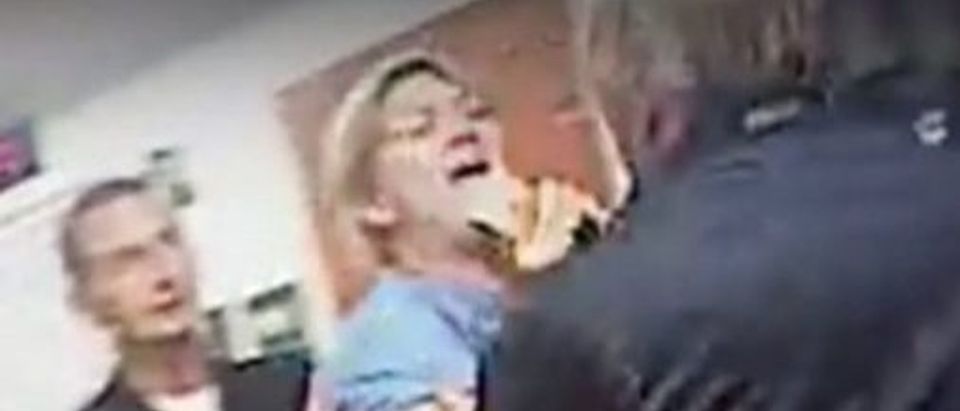The near-universal outrage surrounding the arrest of Alex Wubbels, the Salt Lake City nurse who was arrested July 26 for refusing to let police officers draw blood from an unconscious car crash victim, empowered Wubbels and her attorney to threaten legal action against the police on CNN’s “New Day” on Monday. At the very least, Wubbels says, she’d like to “re-educate” the police department on proper procedure.
However, despite reams of inaccurate reporting on the incident, the case is a much closer one than it appears.
In a widely-seen video documenting her arrest, Wubbels calmly tells a police officer, Jeff Payne, that hospital policy permits the police to draw blood from patients in only three instances: when the patient consents, when the patient is under arrest, or when the police officer has a warrant.
After a hospital administrator tells Payne he is making a “mistake” by insisting he has the right to obtain the blood, Payne forcibly detains the nurse. She was released about twenty minutes later outside the hospital.
Never mind the fact that Section 1.3 of the Utah Commercial Driver’s License Handbook states that “If you operate a CMV [commercial vehicle], you shall be deemed to have given your consent to alcohol testing,” creating a potential implied consent justification for the blood draw because the victim was driving a commercial truck. Never mind that the hospital’s policy does not have the force of law, even if the local police department agreed to its terms.
Crucially, the hospital’s policy, as read by Wubbels, overlooks a well-established exception to the warrant requirement: Police do not need a warrant if exigent circumstances, and probable cause, justify an urgent search and seizure of evidence. The imminent loss of blood evidence, which would be useful in a drunk-driving case, qualifies as a potentially exigent circumstance. (The exigent circumstances exception also permits police to barge into your house without a warrant if, for example, you are being held hostage, or drug suspects flee into your bathroom and begin flushing their contraband down the toilet).
Regardless of whether such an exigency existed in this case — all the facts are not yet clear — it is troubling that Wubbels, the police, and the hospital policy never mention exigency, even as a possibility. Wubbels discussed the possibility of consent, a warrant, or an arrest justifying a blood draw, but she never covers exigency.
News reports have erroneously created the impression that exigency is simply irrelevant in drunk driving cases. In its reporting of this incident, The New York Times flatly, and falsely, claimed that “the United States Supreme Court ruled that the police do not have the right to draw blood in drunk driving investigations without a warrant.”
But the case the Times cites, Missouri v. McNeely, does not stand for that proposition at all. The court actually held in McNeely that some drunk-driving cases could permit warrantless blood draws.
“When officers in drunk-driving investigations can reasonably obtain a warrant before having a blood sample drawn without significantly undermining the efficacy of the search, the Fourth Amendment mandates that they do so,” the Court wrote. “Circumstances may make obtaining a warrant impractical such that the alcohol’s dissipation will support an exigency, but that is a reason to decide each case on its facts….”
There are some other considerations at play here. The police are on far shakier ground if they demanded the nurse to draw blood for them, as opposed to the police drawing the blood themselves. But the video suggests that the police wanted to draw the driver’s blood, not force someone else to do it.
“If she interferes in any way with me getting the blood drawn, she needs to be arrested,” an officer says early on in the video. And The Washington Post has reported that Payne is a trained police phlebotomist, meaning that he is sent to hospitals to collect blood from patients and check for illicit substances.
But the coverage of this incident has focused so much on outrage that outlets cannot agree on even this basic factual issue. CNN has reported that the nurse “refused to let police officers draw blood.” The New York Times reported that the nurse was arrested after “refusing to draw patient’s blood.” News outlets cannot even agree on who was going to draw the blood.
That the patient’s vehicle was struck by another car also raises questions as to whether it was legally reasonable for the police to obtain his blood sample if he was, in fact, a victim not suspected of any crime. Media reports have suggested that Payne wanted to confirm that the patient did not contribute to the crash, or that he felt he had implied consent for the blood draw.
Whether Payne’s concerns as to the patient’s potential criminal wrongdoing were reasonable enough to justify the exigency exception requires a fact-specific inquiry, and all the facts supporting Payne’s suspicion are not yet clear. Regardless, it is certainly not, as the nurse suggested, de facto impermissible for police to seek a blood sample without an arrest, a warrant, or consent.
Officer Payne is now on paid administrative leave. The chief of the Salt Lake City police department has said he is “alarmed” and “sorry.” There is talk of lawsuits and criminal investigation. The mayor of Salt Lake City has called the arrest “completely unacceptable” and apologized.
As the fallout continues, both the police department and the hospital should discuss ways to improve their search and seizure policies going forward — and the media should pay closer attention to some of the key legal facts at issue.
Gregg Re can be reached at gregg@dailycallernewsfoundation.org.












